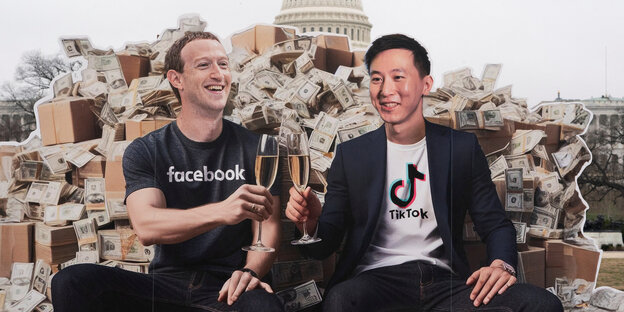The “Child Online Safety Act” (Kosa) aims to force social media platforms to take measures to protect minors. How effective is that?

An installation protesting Meta CEO Mark Zuckerberg and TikTok CEO Shou Zi Chew in front of the US Capitol in Washington. Photo: Nathan Howard/Reuters
Even for those familiar with the spectacle of American politics, it was an extraordinary moment when Sen. Josh Hawley of Missouri asked Marc Zuckerberg at a Senate Judiciary Committee hearing to apologize to the parents in the room whose children had died. as a result of intense fighting. social networks.-Uso had suffered serious damage to his health or had even died. The billionaire stood up, turned around and said somewhat awkwardly that he was sorry and that Meta was investing billions to prevent something like this.
The hearing, attended by the bosses of to prevent sexual exploitation, anorexia, self-harm and aggressive marketing among minors.
Washington experts are not too optimistic: the concentrated lobbying power of the platforms and the concerns of data protection advocates will reduce this initiative to the “reasonable” level in line with the market. It's also been a long time since we read anything about prosecutors suing Tiktok and the like in 33 states because they promote harm to the health of young people. Meanwhile, Zuckerberg is building a fortified property with a nuclear bomb-proof bunker on a Hawaiian island.
In Europe, the Digital Services Act has been in force since 2022 with Kosa-type protective clauses and threats of punishment against platform operators. But overall, politics in the liberal democratic West seems defenseless against the growing power of the world's new masters. Until now, in any case, the morally justified withdrawal of Internet licenses for Tiktok or
Fainting?
With their inaction (is it really impotence?) governments are undermining the foundations of democracy and, therefore, their own power. Because even if it were possible to limit the most perverse effects on children and young people with laws like the Digital Services Act, and even if it were assumed that the punishment for not doing so would be so massive that it would affect the substance of corporations: it would not change anything of the normal destruction caused by “clean” platforms. In the damage to the intellectual and emotional development, the ability to concentrate and the sense of reality of adolescents and the growing confusion between the false and the real, between fantasy and phenomena, between deception and reality.
Anyone who has been on Tiktok in recent days, as the old saying goes, might get a chill: even demonstrations of hundreds of thousands were faked with replay pressed tens of thousands of times, here a The government with “media Obedient to the State, they had created a second Stasi and started government marches against the opposition, reminiscent of the “darkest times.” If you stare at one of these monstrosities for more than a few seconds, the thread will contain more and more subversive insults and far-right trash, highly tuned by the AI. The algorithm works according to the logic of addiction, each person gets what they believe and need.
I consider it a negligent omission to have ignored these platforms for a long time because they were despised. “Historical experience says: reflection only begins when something has been lost. But if the public is lost, the world of forms of reflection is also lost,” Alexander Kluge stated 38 years ago in an essay titled “The power of the consciousness industry and the destiny of our public.” The public is the “vessel of democracy,” Kluge wrote at the time of the Big Bang of the privatization of radio and television.
Savings plans
Nowadays, given the progressive displacement of information and “culture” towards platforms, it is more than negligent if, for example, driven by the AfD's attacks on “pay television”, the CDU also launches plans of populist austerity in their “media”. documents”; if the experts of the “Commission of the Future” think first of savings, where the shift of offers towards digital is further accelerating the fragmentation of public space and, therefore, on the contrary, an expansion of the non-commercial, the values Journalism, illustration and the media committed to democratization urgently need, including their financing. Because “you can only fight products with products” (Kluge).
Just as it would be necessary to anchor the independence of the Constitutional Court in the Basic Law, it would be necessary to protect the public media system from damage by right-wing governments. Alexander Kluge again: “Whoever destroys the classical public sphere is a criminal of history.”
For years I have also been waiting for a forceful speech in the Bundestag that calculates to the critics of broadcasting fees how many “rates” they pay for supposedly free television just with their daily purchases: a multiple of what the GEZ pays. Their contribution represents a considerable load. Not to mention the advertising revenues of Internet platforms, which have already caught up with analogue media and are increasing (cf. alarmingly: Martin Andrée, “Big Tech must go!”, Campus Verlag 2023).
All of this requires speed. 21 percent of Germans are already on Tiktok, about 90 minutes a day: there will probably be many more among tomorrow's voters.